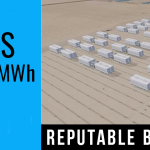
With many climate protection advocates as well as the industry itself calling on Europe’s lawmakers to recognise the importance of energy storage, a “significant slowdown” in 2019 is expected to be countered with a more positive outlook going forwards.
Yesterday (23 March 2020), the European Association for Storage of Energy (EASE) and analysis firm Delta-EE released the latest annual edition of its European Market Monitor for Energy Storage (EMMES). It shows that 1GWh of energy storage was deployed across Europe in 2019, a “significant slowdown” compared to the previous year, when over 1.4GWh was installed.
Market dynamics across the continent are complex – the main form of remuneration for large-scale energy storage in particular is to be found in providing frequency regulation and other ancillary services to grid operators, rather than in bulk storage and dispatch of energy from batteries. This front-of-meter segment, where battery systems are connected directly to the grid, saw a slowdown as frequency containment reserve (FCR) markets are becoming saturated in former leading regions such as the UK and Germany, the report found.
At the Energy Storage Summit hosted in London by our publisher Solar Media, for example, Jochen Schwill, CEO of Next Kraftwerke, an aggregator that plays into those markets, said that weekly prices paid for services in Germany have halved, while there is no market for longer duration storage.
“The prices in these markets has reduced from €16 (US$17.26) per MW per hour back in 2015 down to €6 per MW/hour today so it’s a big reduction in this price and Next Kraftwerke is a German aggregator, so they were taking the batteries to the market – and the German market is seriously slowing down in the past [couple of] years,” Corentin Baschet, head of market analysis at market research and technical consulting services company Clean Horizon, told Energy-Storage.news in an interview.
Europe’s FCR market is now interconnected, with six countries involved (Germany, France, Austria, Belgium, the Netherlands and Switzerland – with Denmark set to also join soon) and this has increased the efficiency with which batteries can quickly balance the supply and demand for electricity across the continent.





